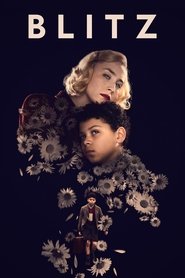Almost certainly Steve McQueen's worst movie to date, I was not merely disappointed with how Blitz turned out, but I think I actively dislike it. The hoariest of narratives about the Second World War combine with the most hackneyed portrayal of Britons at the time, with something horribly studied and very distancing about the working-class accents and personas in particular.
The film additionally orchestrates a number of race-related (or at least race-inflected) interactions between its characters that become heated — events that not only have a hollow sense of a contrivance but typically conclude in a lofty peroration where a Black or otherwise minority character uses the racist's own logic against themselves. This cheap "checkmate, xenophobes" rejoinder is not only ineffective in real life, but it feels especially hollow coming from a subtle and intelligent filmmaker like McQueen, who surely knows the limits of this kind of argument. (Perhaps more unsavoury is that the film seems to endorse a kind of frictionless 'inclusive nationalism' that nags at me in a way I can't quite properly express, notwithstanding its obvious ahistoricity. Isn't it better argument for inclusivity today to point out others' violent exclusion in the past)
In Blitz, racism is reduced to a long series of slurs, slights, snubs and strikes to the face: grossly abhorrent, to be sure, but this account of racism leaves far too much room for all kinds of systematic mis-understanding of race, and, most importantly for Blitz, in the particularly British way race is imagined. It also leaves room for liberals to believe that they are not subject to racial logics as they don't commit unspeakable acts of physical and emotional violence. The line that "there is no segregation here" also cheers along the extremely widespread and reflexive response in the UK that "we're not as racist as America", and so therefore there is nothing in Britain's past, present or future worthy of examination... let alone change. The few shots of Empire goods are the film's only positive move in a more critical direction to me, but these sequences not only feel far too mannered, they can hardly be argued they are integral to the narrative. Given the film otherwise contains the most sentimental and hackneyed caricatures, the tone and level of the movie does not invite the viewer to think on that level. Not unrelatedly, I can find much to applaud about the representation in this movie's casting, but it started to feel like gimmicky and self-congratulatory with the extended dance sequences. And, although he is based on a genuine, real-life character, the film reaches an almost self-parodic level with the inclusion of named character who is a communist Jew with dwarfism.
Indeed, without being too rude or dismissive about it, but is this film actually intended for children? Almost every scene that might potentially be difficult to parse is explained in the dialogue (e.g. "you had a turn!") lest you misunderstand Stephen Graham's mental illness. Ditto "they had their lungs blown out" in the bomb aftermath scene. Or perhaps the audience is someone different altogether. Just as the rhetoric of "the Blitz spirit" at the time was in large part a propaganda effort directed principally towards a neutral America, Blitz might be intended for overseas consumption as well, just as BBC's prestige dramas now seem oddly tweaked to be sold to the American cable networks. Joe Kennedy writes in Authentocrats about "the capacity of memorialization to ring-fence a historical event critique, to turn it into untouchable mythology", and it is a little depressing to realise that even McQueen can't seem to penetrate it.
Unfortunately, its dynamic abstraction soon gives way to less vital images of midcentury working-class life that expose some of the director’s limitations. [Immaculate] framing and lighting can’t help but enhance the film’s burned-in nostalgic glaze and exacerbate the two-dimensionality of the characters, which dulls the emotional impact of the traumas to which they’re subjected. Audiences with a thirst for images of flattened urban architecture, shell-shocked civilians, and outpourings of grief certainly have no shortage of those in 2024, and it’s difficult to say how deeply McQueen ponders how his fictional work fits into this broader sociopolitical landscape. [And] the film’s oversimplification of the era’s overt prejudices makes racism more of a textural element, as opposed to something to be seriously reckoned with.
— David Robb (Slant Magazine)
Transposes a series of picaresque, Dickensian tropes onto a World War II narrative. In bleeding together the 19th and 20th centuries, McQueen is clearly trying to say something about the representation of British history and also about his responsibilities as a filmmaker in the present tense.[…]
As played by the musician Benjamin Clementine, Ife—whose name, we are told, is Nigerian for “love”—is a welcome presence; he’s based on a real-life figure, which makes his mechanical treatment at the hands of the filmmakers that much more frustrating. Despite Clementine’s lovely performance, the character comes off as a simple prop to occupy the movie’s time and to score a rhetorical point.
— Adam Nayman (The Ringer)
Like Martin Scorsese’s Hugo and Todd Haynes’s Wonderstruck, Blitz doesn’t feel like it’s taking place from the perspective of a child so much as it does an adult who’s stooping to a child’s level and struggling to maintain the position. The prescriptive nature of its aims intrudes on its ability to fully immerse itself in its main character as he gets exposed to the ugliness and the generosity humanity is capable of.
— Alison Willmore (Vulture)

